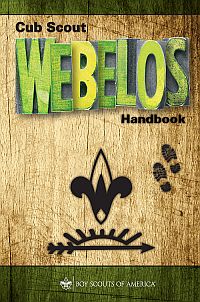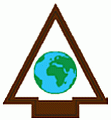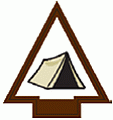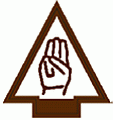Become A Sponsor
|
Why Ads
 |

Arrow of Light Core Adventures
|
These were the requirements
from December 1, 2016, until the revisions made
on September 1, 2018
To see the CURRENT requirements,
Click
here.
For the previous requirements,
Click here
Note: BSA originally published changes to Cub Scout advancement requirements in late November, 2016, in the form of an on-line document listing the original and proposed requirements.
The revised requirements were later published in addendum booklets to be inserted in the Cub Scout Handbooks for each level until they can be revised and republished. The wording
shown below, which appears in the addendum booklets, is similar to, but does not exactly match the wording in the original proposal. The differences are noted
below.
NOTE: The "Camper" Adventure has been renamed
the "Outdoorsman" Adventure.
The name will change again, to "Outdoor Adventurer" as part of the
implementation of family Scouting.
There are 4 Core (Required) Adventures in the Arrow of Light program:
- Building a Better World
- Duty to God in Action
- Outdoorsman
- Scouting Adventure
 |
Complete the following requirements.
- Explain the history of the United States flag. Show how
to properly display the flag in public, and help lead a flag
ceremony.
- Learn about and describe your rights and duties as a citizen,
and explain what it means to be loyal to your country.
- Discuss in your Webelos den the term “rule of law,” and
talk about how it applies to you in your everyday life.
- Meet with a government or community leader, and learn about
his or her role in your community. Discuss with the leader an
important issue facing your community.
- Show that you are an active leader by planning an activity
for your den without your den leader’s help. Ask your den leader
for approval first.
- Do at least one of these:
- Learn about Scouting in another part of the world. With
the help of your parent, guardian, or den leader, pick one
country where Scouting exists, and research its Scouting
program.
- Set up an exhibit at a pack meeting to share information
about the World Friendship Fund.
- Under the supervision of your parent, guardian, or den
leader, connect with a Scout in another country during an
event such as Jamboree on the Air or Jamboree on the Internet
or by other means
- Learn about energy use in your community and in other
parts of the world.
- Identify one energy problem in your community, and find
out what has caused it.
Workbook for use with these requirements:
PDF Format
DOCX Format
|
 |
Complete Requirements 1 and 2 and at least two others.
- Discuss with your parent, guardian, den leader, or other
caring adult what it means to do your duty to God. Tell how
you do your duty to God in your daily life.
- Under the direction of your parent, guardian, or religious
or spiritual leader, do an act of service for someone in your
family, neighborhood, or community. Talk about your service
with your family. Tell your family how it related to doing your
duty to God.
- Earn the religious emblem of your faith that is appropriate
for your age, if you have not done so already.
- With your parent, guardian, or religious or spiritual leader,
discuss and make a plan to do two things you think will help
you better do your duty to God. Do these things for a month.
- Discuss with your family how the Scout Oath and Scout Law
relate to your beliefs about duty to God.
- For at least a month, pray or reverently meditate each day
as taught by your family or faith community.
Workbook for use with these requirements:
PDF Format
DOCX Format
|
 |
Complete Option A or Option B.
- Option A
- With the help of your den leader or family, plan and
participate in a campout.
- On arrival at the campout, with your den and den leader
or family, determine where to set up your tent. Demonstrate
knowledge of what makes a good tent site and what makes
a bad one. Set up your tent without help from an adult.
- Once your tents are set up, discuss with your den or
family what actions you should take in the case of the following
extreme weather events:
- Severe rainstorm causing flooding
- Severe thunderstorm with lightning or tornadoes
- Fire, earthquake, or other disaster that will require
evacuation. Discuss what you have done to minimize as
much danger as possible.
- Show how to tie a bowline. Explain when this knot should
be used and why. Teach it to another Scout who is not a
Webelos Scout.
- Recite the Outdoor Code and the Leave No Trace Principles
for Kids from memory. Talk about how you can demonstrate
them while you are working on your Arrow of Light. After
one outing, list the things you did to follow the Outdoor
Code and Leave No Trace.
- Option B
- With the help of your den leader or family, plan and
participate in an outdoor activity.
- Discuss with your den or family what actions you should
take in the case of the following extreme weather events:
- Severe rainstorm causing flooding
- Severe thunderstorm with lightning or tornadoes
- Fire, earthquake, or other disaster that will require
evacuation. Discuss what you have done to minimize as
much danger as possible.
- Show how to tie a bowline. Explain when this knot should
be used and why. Teach it to another Scout who is not a
Webelos Scout.
- Recite the Outdoor Code and the Leave No Trace Principles
for Kids from memory. Talk about how you can demonstrate
them while you are working on your Arrow of Light. After
one outing, list the things you did to follow the Outdoor
Code and Leave No Trace.
Workbook for use with these requirements:
PDF Format
DOCX Format
|
 |
Complete the following Requirements.
- Prepare yourself to become a Boy Scout by completing at
least a-c below:
- Repeat from memory the Scout Oath, Scout Law, Scout
motto, and Scout slogan. In your own words, explain their
meanings to your den leader, parent, or guardian.
- Explain what Scout spirit is. Describe for your den
leader, parent, or guardian some ways you have shown Scout
spirit by conducting yourself according to the Scout Oath,
Scout Law, Scout motto, and Scout slogan.
- Give the Boy Scout sign, salute, and handshake. Explain
when to use each.
- Describe the First Class Scout badge, and tell what
each part stands for. Explain the significance of the First
Class Scout badge.
- Repeat from memory the Pledge of Allegiance. In your
own words, explain its meaning
- Visit a Boy Scout troop meeting with your parent or guardian
and, if possible, with your den members and leaders. After the
meeting, do the following:
- Describe how the Scouts in the troop provide its leadership.
- Describe the four steps of Boy Scout advancement.
- Describe ranks in Boy Scouting and how they are earned.
- Describe what merit badges are and how they are earned.
- Practice the patrol method in your den for one month by
doing the following:
- Explain the patrol method. Describe the types of patrols
that might be part of a Boy Scout troop.
- Hold an election to choose the patrol leader.
- Develop a patrol name and emblem (if your den does not
already have one), as well as a patrol flag and yell. Explain
how a patrol name, emblem, flag, and yell create patrol
spirit.
- As a patrol, make plans to participate in a Boy Scout
troop’s campout or other outdoor activity.
- With your Webelos den leader, parent, or guardian, participate
in a Boy Scout troop’s campout or other outdoor activity. Use
the patrol method while on the outing.
- Do the following:
- Show how to tie a square knot, two half hitches, and
a taut-line hitch. Explain how each knot is used.
- Show the proper care of a rope by learning how to whip
and fuse the ends of different kinds of rope.
- Demonstrate your knowledge of the pocketknife safety rules
and the pocketknife pledge. If you have not already done so,
earn your Whittling Chip card.
Workbook for use with these requirements:
PDF Format
DOCX Format
|
Sources: Cub Scout Webelos Handbook (#33452 -
SKU 620139)
and
Cub Scout Webelos Requirement Modifications (Addendum booklet #220-118 SKU 639154)
Page updated on:
September 25, 2018
|












